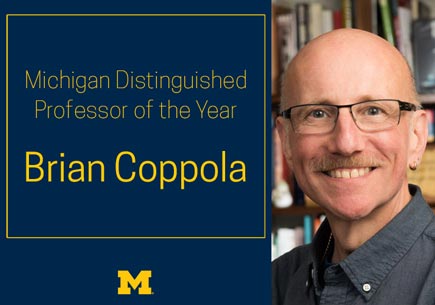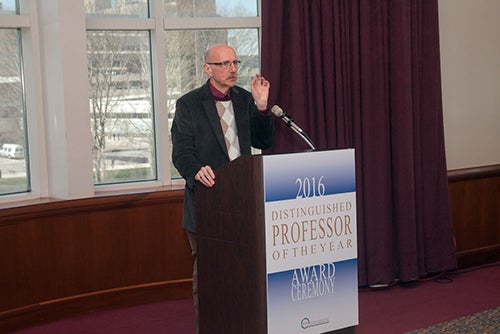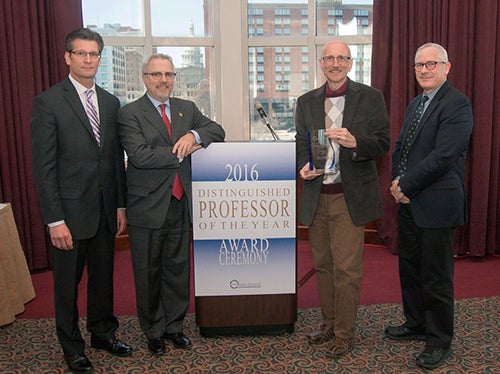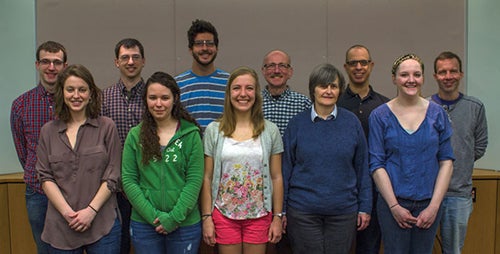April 15, 2016:
Chemistry professor receives statewide teaching honor



April 25, 2016:
Faculty projects honored for innovative teaching methods
 CSIE|UM:
CSIE|UM:
Improving Instruction and Nurturing Future Science Educators
U-M News Report
 Brian P Coppola
Brian P Coppola
April 15, 2016:
Chemistry professor receives statewide teaching honor



April 25, 2016:
Faculty projects honored for innovative teaching methods
 CSIE|UM:
CSIE|UM:
Improving Instruction and Nurturing Future Science Educators
U-M News Report
 “1900 Paris 2015” (2016)
“1900 Paris 2015” (2016)
by Gerhard (1959-)
18×24 in., ink and watercolor
Coppola Collection
“As long as war is regarded as wicked, it will always have fascination. When it is looked upon as vulgar, it will cease to be popular.” – Oscar Wilde
I kicked off this idea by sketching out (verbally) what I had in mind to the always stellar and fun-to-collaborate-with Gerhard. The actual visualization is all him, of course, as was the brilliant idea to populate the cafe which, in my original idea, was abandoned. Ger’s contribution to this piece is substantial.
Oscar Wilde was a victim in the ideological war against homosexuality in late 1800s England, where he was imprisoned and served two years of hard labor. He was released from prison, moved to Paris under a pseudonym, and lived out his last few years at a hotel residence with a Ram’s head over the entrance. He died, in Paris, in 1900.
About 3 Km away from the hotel where Wilde died is the Carillon Hotel and its café, where many patrons died in 2015 as victims in a bombing associated with another kind of ideological war.
In bringing these stories together, we have a contemporary couple holding hands, a symbol of 2015 and some progress made in Wilde’s war, which has not been won, everywhere, and particularly in places where certain ideologies are still strongly held beliefs.
Our victorious couple notes the memory (a virtual existence) of Wilde at the café. Wilde is in the vibrant colors of the living couple as his ideology is alive. But we also note our many friends at the café who died an equal opportunity death for transgressions against God and Nature, in 2015, that made about as much sense as Wilde’s did in 1900.
Who can play the role of Wilde to bring resolve in this new war? Ironically enough, it is a war fought over religious ideologies as much as any other, and so (believe me!) it was tempting to have Gerhard include an inverted crucifix on the wall of the cafe. But I did not go that far. Sue me.
At the end of the day, it is the people who need to bring sensibility to the insensible.
In Wilde’s war, we have our couple representing this victory of people. And so, now, you might have noticed that these two guys are at least ambiguous in their nationalities, and might well be drawn from Middle Eastern models. The future victory in this vulgar war will come (again) from the decisions made by people, who will bring life and color to the gruesome cadre of victims who live in the muted tones of our landscape and mindscape.
The title I selected is rather obvious, but it was not the first one I thought of. While in Paris, Wilde took the name “Sebastian Melmoth”, after Saint Sebastian, and the title character of Melmoth the Wanderer – a Gothic novel by Charles Maturin, Wilde’s great-uncle. One of the titles I had in mind for this was “The Resurrection of Saint Sebastian.”